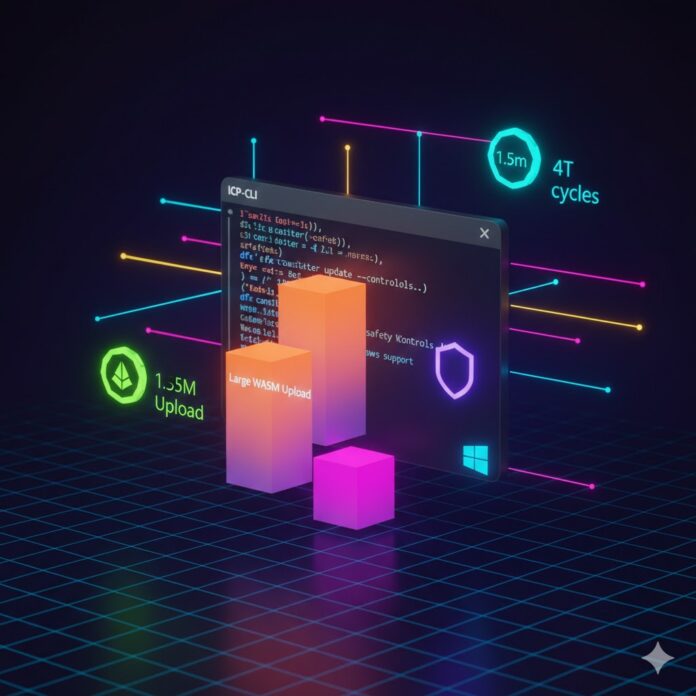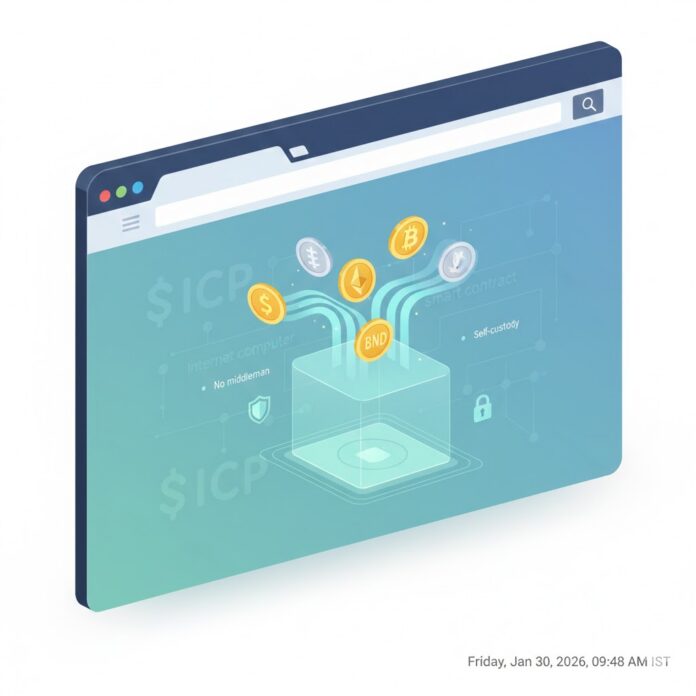Dominic Williams has offered a striking prediction about the future of the internet: a world where creating apps is no more complex than having a chat. According to the DFINITY founder, the days of Web3 developers labouring over lines of code may be coming to a close, replaced by AI-fuelled natural language interfaces powered by what he calls “Web4 blockchains”.
In a recent post on X, Williams painted a picture of 2030 in which 35,000 developers evolve into more than 100 million people creating sovereign apps simply by talking to AI systems. He described a future where AI doesn’t just assist development—it replaces traditional coding altogether. The result? Everyday users shaping digital tools tailored to their needs, no longer reliant on technical expertise.
“Think ICP + Caffeine,” he wrote, referencing Internet Computer Protocol (ICP) and Caffeine, two projects that seek to reimagine decentralised infrastructure and interaction. The implication is that these technologies, working together, could form the basis of a new kind of internet—one that blurs the line between user and builder.
The comment triggered a wave of conversation. One software developer, replying with the handle @AmSpeed01, suggested even Williams’ estimate might be too modest: “100m is a bit conservative… 1Bill?” Williams responded confidently, “Yes, I believe it will be vastly more than 100m.” He expanded on the thought, saying that app creation would eventually become as widespread and routine as browsing the web is today. Even whimsical needs, he said, could be met by custom-built functionality created on the fly through conversational prompts.
That sort of future hinges on a few key developments. First, AI would need to become far more accessible and intuitive, capable of understanding and executing user intent through everyday language. Second, blockchain infrastructure would have to be lightweight and flexible enough to support large-scale, real-time app generation and deployment.
Projects like Internet Computer Protocol are positioning themselves at this intersection. ICP aims to replace traditional cloud services with decentralised computation, offering a platform where data, apps, and services can run directly on-chain. Combined with AI systems that interpret user intent, the goal is to create a self-contained internet stack—cutting out centralised intermediaries entirely.
Caffeine, meanwhile, has been exploring interfaces that simplify how users interact with blockchain services. While details of how the two projects would integrate remain speculative, their combined mention suggests a direction: one where decentralised backend infrastructure pairs with user-friendly AI on the front end.
There’s growing appetite for this kind of reimagining. Generative AI tools have already changed how people write, design, and code. If the interface shifts from typing code to simply speaking, the barrier to entry collapses. That could change who gets to build the web—and what gets built.
Williams has long been known for pushing bold ideas about the future of decentralised technology. While some in the Web3 community embrace the optimism, others remain cautious. The transition from developer-driven platforms to user-led app creation would require substantial advances in AI accuracy, data security, cost efficiency, and scalability. Moreover, there’s the matter of governance—who sets the rules, and how they’re enforced, in a world where millions of people can launch applications at will.
Still, the conversation is moving. Williams’ post may be speculative, but it touches on themes that many in the tech world are now confronting: the role of AI in shaping software, the future of decentralised infrastructure, and how the average person will interact with both.
Whether the future holds 100 million or one billion new app creators, the direction seems clear: easier creation, more individual control, and less reliance on traditional development tools. The shift may not happen overnight, and there are many moving parts, but the idea that “creating will become as common as web browsing” feels less outlandish than it did even a few years ago.
For now, the work continues—on ICP, on Caffeine, and on countless other projects rethinking the building blocks of the internet. As these technologies evolve, the gap between idea and execution may continue to shrink, one conversation at a time.
Dear Reader,
Ledger Life is an independent platform dedicated to covering the Internet Computer (ICP) ecosystem and beyond. We focus on real stories, builder updates, project launches, and the quiet innovations that often get missed.
We’re not backed by sponsors. We rely on readers like you.
If you find value in what we publish—whether it’s deep dives into dApps, explainers on decentralised tech, or just keeping track of what’s moving in Web3—please consider making a donation. It helps us cover costs, stay consistent, and remain truly independent.
Your support goes a long way.
🧠 ICP Principal: ins6i-d53ug-zxmgh-qvum3-r3pvl-ufcvu-bdyon-ovzdy-d26k3-lgq2v-3qe
🧾 ICP Address: f8deb966878f8b83204b251d5d799e0345ea72b8e62e8cf9da8d8830e1b3b05f
🪙 BTC Wallet: bc1pp5kuez9r2atdmrp4jmu6fxersny4uhnaxyrxau4dg7365je8sy2q9zff6p
Every contribution helps keep the lights on, the stories flowing, and the crypto clutter out.
Thank you for reading, sharing, and being part of this experiment in decentralised media.
—Team Ledger Life




